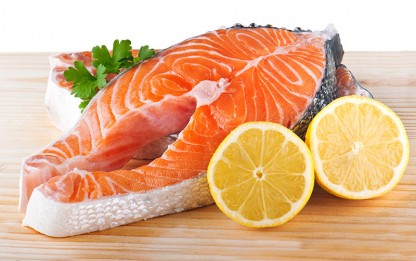Fish: One of the Best Foods That Help Depression
 As a Pacific Northwesterner, I am surrounded by good seafood. Fish is one of my family’s favorite foods, and we have a variety of family recipes to cook up everything from fresh salmon to crab.
As a Pacific Northwesterner, I am surrounded by good seafood. Fish is one of my family’s favorite foods, and we have a variety of family recipes to cook up everything from fresh salmon to crab.
Whenever I think of making a healthy meal, the first thing that comes to mind is a dinner featuring fish as the main dish. Whether its salmon on the barbecue, halibut with capers in a saucepan, or a baked filet crusted in almond meal, it’s easy to make a super-healthy meal out of a variety of types of fish. And the health benefits of doing so are incredible.
Why is fish so healthy? One of the many reasons is that it’s one of the best foods that help depression.
Get Your Nutrition Guide
Do you want to eat foods that help you feel better, stay slim, and avoid diet-related diseases? Do you want to be healthier by eating delicious “super” foods?
If so, claim your FREE copy, right now, of the definitive nutrition guide on living a longer, healthier, happier life.
The Link Between Fish and Depression
One of the best things you can do for your brain health is to get more omega 3s in your diet. These healthy fats, which are abundant in fish, have long been implicated in depression.
Fish is also a major component of the Mediterranean diet, which is an effective diet for preventing depression. Read more about the link between depressive symptoms and the Mediterranean diet here.
But will simply eating more fish really help you fight off depression? Researchers say yes.
Higher Fish Consumption: Associated with a 17 Percent Lower Risk of Depression
The Journal of Epidemiology & Community Health published a study in September 2015 that looked at the association between fish consumption and depression risk. The meta-analysis included data from 26 studies and more than 150,000 participants.[1]
People who ate the most fish were 17 percent less likely to have depression compared to those who ate the least. When the researchers looked at the effects specific to gender, the effects of fish consumption remained consistent, but the relationship was stronger in men. High fish consumption was associated with a 20 percent lower risk in men, and 16 percent lower risk in women.[1]
The authors concluded, “The findings showed a significant inverse association between fish consumption and depression overall.”[1]
Why Is Fish So Good for Depression?
As mentioned earlier, increasing omega-3 intake is believed to be an important strategy to help protect against depression. And one of the best ways to get more omega-3 in your diet is by eating more fish.
Omega 3s are important for the proper structure of membranes in the brain, as well as in the transmission of the neurotransmitters serotonin and dopamine. Healthy function of both of these neurotransmitters is important for keeping the brain healthy and preventing symptoms of depression.[1]
Eating Fish for Depression Protection
Incorporating more fish into your diet will not only help protect against depression, but it will also be good for your heart, prevent inflammation, and more. Try eating fish twice per week for maximum benefit.
One major consideration you’ll need to be aware of when eating fish is mercury contamination. For a guide on safe fish consumption, read more in Fish Low in Mercury Provide the Health Benefits of Seafood Without the Risks.
Share your experience
Do you eat fish? What health benefits have you experienced by doing so? Share your favorite ways to prepare fish in the comments section below.
WHAT YOU SHOULD KNOW
According to the Washington State Department Health, the following types of fish have omega-3 levels above 500mg per three ounces. These varieties have been separated into two groups according to their mercury levels.
It’s considered safe to eat 2-3 servings of the following types of fish each week:
- Anchovies
- Black sea bass
- Herring
- Mackerel (canned)
- Oysters
- Salmon, including chinook (King), chum, coho, farmed, pink, and sockeye
- Sardines
It’s considered safe to eat one serving of the following types of fish each week:
- Albacore tuna (fresh, canned white)
- Sablefish/black cod
Women who are pregnant or nursing and children should avoid eating fish with high levels of mercury and other contaminants because it can affect a child’s developing brain and immune system. Mercury can also affect the nervous and cardiovascular systems in adults. Fish with high mercury levels that children and pregnant and/or nursing women should avoid include:
- Mackerel (King)
- Marlin (imported)
- Shark
- Swordfish
- Tilefish
- Tuna Steak (bluefin and bigeye)
For more information about mercury poisoning, check out “How Do I Know If I Have Mercury Poisoning?”
[1] J Epidemiol Community Health. 2015 Sep 10. [Epub ahead of print]
The post Fish: One of the Best Foods That Help Depression appeared first on University Health News.
Read Original Article: Fish: One of the Best Foods That Help Depression »
Powered by WPeMatico


